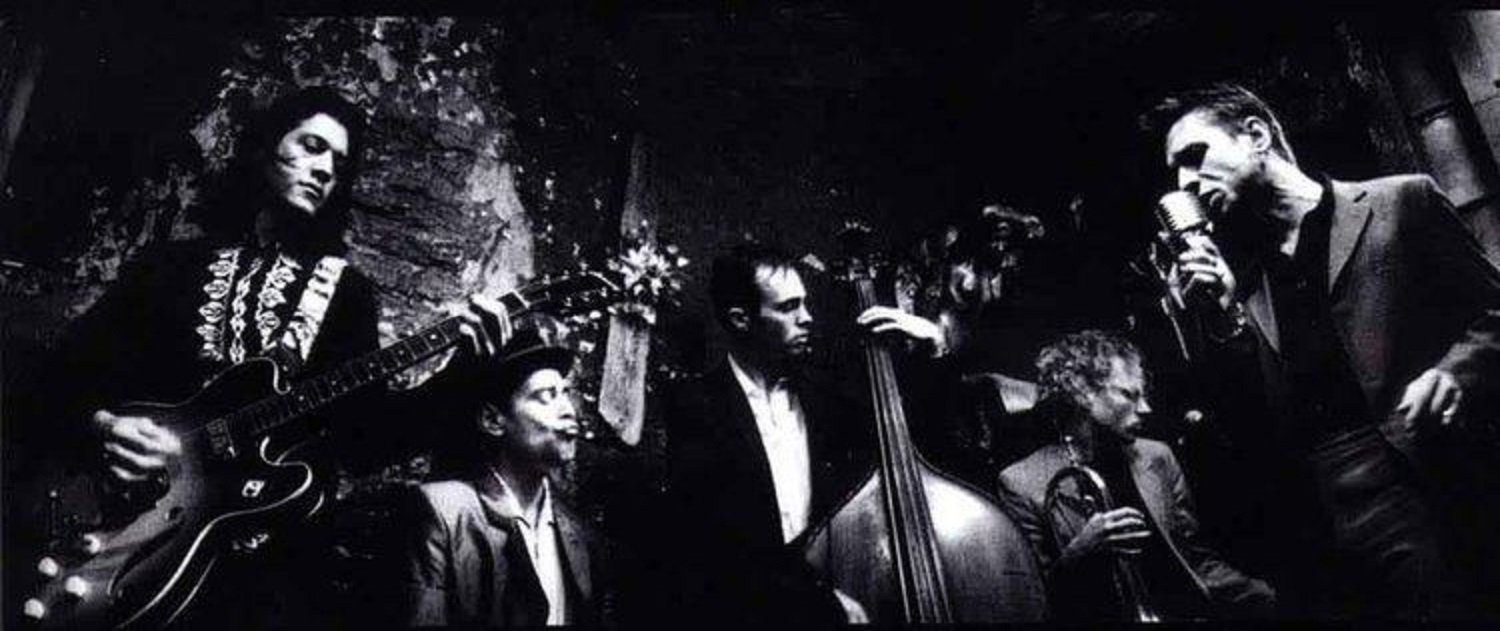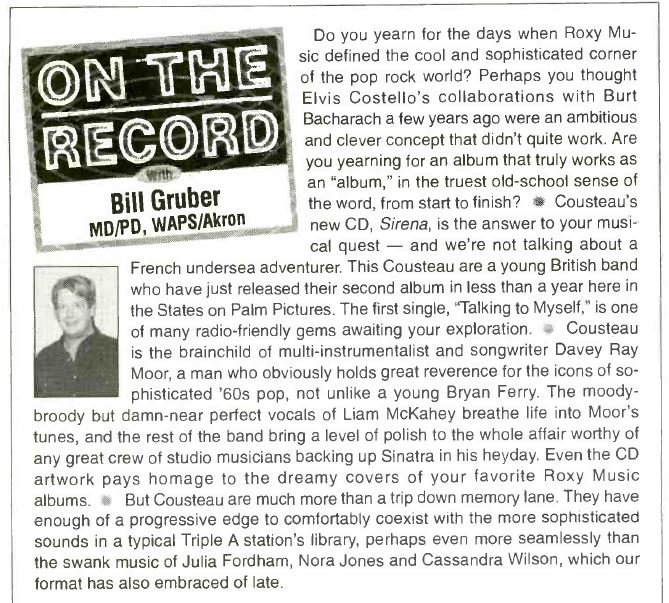Episode 38
Cousteau
by Cousteau
Cousteau (Palm Pictures, 2000). Photograph by Paul McDermott.
“Bohemian Scott Walker-esque Anglo-Irish-Australian quintet.”
Select (December, 1999)
“Dark, sexy torch songs from an Irishman and an Englishman in natty suits. What’s not to love?”
Spin (September, 2001)
“Covering similar ground to fellow frowning suit-wearers the Tindersticks, Cousteau deliver melodramatic torch songs. Cousteau have Liam McKahey’s remarkable, Scott Walker-clone voice and Davey Ray-Moor’s songs to recommend them.”
Select (December, 1999)
“An album of genuinely haunting beauty. This is late-night balladeering with a deadly serious intent.”
Rolling Stone (December, 2001)
“Beautiful, timeless songs as pure as the peers they seek to emulate.”
NME (June, 2001)
On this episode I’m joined by Liam McKahey and Davey Ray Moor for a deep dive into Cousteau’s self-titled debut album from 1999. Cousteau were formed in London in the late 90s when singer McKahey, from Cork, hooked up with songwriter and multi-instrumentalist Ray Moor, from Canberra. Guitarist Robin Brown, bassist Joe Peet, and drummer Craig Vear made up the quintet. Cousteau’s self-titled debut album was released in October 1999 by the small UK indie label, Global Warming. After an appearance on Later With Jools Holland… the band were signed by Chris Blackwell’s Palm Pictures. The band’s debut single ‘The Last Good Day of the Year’ became an international hit and the band’s album was re-released. Cousteau toured the world eventually selling a few hundred thousand albums.
“You get all kinds of responses to it, you get people who think of it as sunny-day Sunday morning music, and then some people respond to the tortured, gin-soaked aspect of it.”
Davey Ray Moor (Billboard - 21 April, 2001)
“You don’t have to buy into it, you know, you either like or you don’t. At the end of the day it’s just five guys with instruments playing good music, and there’s not enough of that.”
Liam McKahey (CMJ New Music Monthly - July, 2002)
Liam left Ireland in the mid-80s and played in different bands. Prior to immigrating to London Davey had played keyboards in The Crystal Set alongside bandmate Russell Kilby. The Crystal Set’s debut album From Now On was released in 1987 and produced by Russell’s brother, The Church’s Steve Kilby. The album topped the Australian Independent chart.
Davey moved to London to work on TV and film soundtracks. He met guitarist Robin Brown and hooked up with bassist Peet and drummer Vear, a jazz-based rhythm section, and they eventually found their lead singer when Davey met Liam at a party.
Cousteau’s self-titled debut album was essentially a collection of demos that were issued in October 1999 by the small UK indie label, Global Warming. That version of the album was reviewed in Select magazine in December 1999. “Covering similar ground to fellow frowning suit-wearers the Tindersticks,” wrote Ian Harrison.
“Cousteau deliver melodramatic torch songs. Cousteau have Liam McKahey’s remarkable, Scott Walker-clone voice and Davey Ray Moor’s songs to recommend them. The languid Bacharach of ‘The Last Good Day of the Year’ shows impressive craft.”
Cousteau appearing on Later With Jools Holland… on 20 November 1999 and within days of that appearance the band had been offered a record deal with Chris Blackwell’s Palm Pictures.
“Palm Pictures said, ‘We love this record’.” Davey told Billboard. “We begged with them for the opportunity to tart [the album up].”
The album was repackaged with a new sleeve, a few songs were re-recorded and it was re-released to universal positive praise.
The former Island Records boss told The New York Times that, “artists who can convey their essence onstage still are the ones who build a lasting following. Cousteau has toured, and they now have a strong base. I love their presence onstage, the suave look and feel they have. They almost have a cabaret aura to them, and people really respond to it.”
Rolling Stone declared that Cousteau’s music was, “a lush yet unsettling sound that runs counter to every new trend,” and “music of genuinely haunting beauty. Seductive sounds, and late night balladeering with a deadly serious intent”
Billboard stated that the band had, “a timeless feel in the spirit of songwriters like Burt Bacharach, Elvis Costello, and Leonard Cohen”.
Spin magazine wrote, “the London-based band sounds like Nick Cave meets David Bowie meets Leonard Cohen meets the New York Philharmonic - with an undeniably dramatic Irish lilt, provided by singer Liam McKahey. And it all works.” They continued, “amazing, considering that the album was recorded and pressed by the band themselves on virtually no budget, and still sound like a symphony.”
Closer to home the NME wrote: “Cousteau sound like they spend each day gazing poetically at rain clouds with the world’s volume turned down. But as other dramatically morose bands would testify, gloom is possibly the hardest feeling to get right.”
The NME continued: “You can barely tell whether smooth-throated Irish singer Liam McKahey is moaning about lost love or praising the fantastic state of his romantic life. As indie’s unsung answer to Barry White, you’re simply left overawed in the face of his crooning, it’s barely necessary to go overboard musically and songwriter Davey Ray Moor keeps it perfectly low-key. Hinting at the murky minimalism between Nick Cave and Tindersticks, Cousteau layer flutes, horns and violins over acoustic guitars and pianos and make the gorgeous lilt of debut single ‘The Last Good Day of the Year’ already sound like a classic love song. Sometimes, you see, darkness can be strangely welcoming.”
The Independent in London ended a live review by declaring, “if you haven’t heard ‘The Last Good Day of the Year’, you haven’t lived”
Cousteau twice graced the cover of the Italian weekly culture and music magazine Il Mucchio Selvaggio (10/04/2001 & 09/07/2002).
In 2015, after 10 years apart, Liam and Davey reformed the band as CousteauX. This time a a silent “X” was added to the end of the name after a ‘cease and desist’ request from the Cousteau Society (the oceanographic society founded by Jacques Cousteau in 1973). Their latest album Stray Gods continues in the dark romantic furrow that the duo has carved out.
Stray Gods (Silent X Records, 2021). Photograph by Paul McDermott.
In this episode Liam mentions that he once sang vocals for a band in London called That Mangled Langer. They supported Stump in 1988.
Stump + Edward Baton + That Mangled Langer (15 August, 1988)
For Further Listening/Reading:
For the Irish Examiner’s B-Side the Leeside series I’ve written about Cousteau…
by Paul McDermott
Irish Examiner - 02 September 2021
Cousteau is available on Spotify:
Stray Gods is available on Bandcamp.
“A song about time, beauty, love and loss” - the video for ‘When the Bloom Has left the Rose’ is below…
Below: Press cuttings from various UK and US music publications, click on each image to enlarge.
Select (12, 1999)
Billboard (21/04/2001)
CMJ New Music Monthly (06/05/2001)
Gavin Report (17/08/2001)
Gavin Report (14/09/2001)
CMJ New Music Monthly (07/2002)
Billboard (20/07/2002)
Radio & Records (09/08/2002)
Spin (11/2002)

















